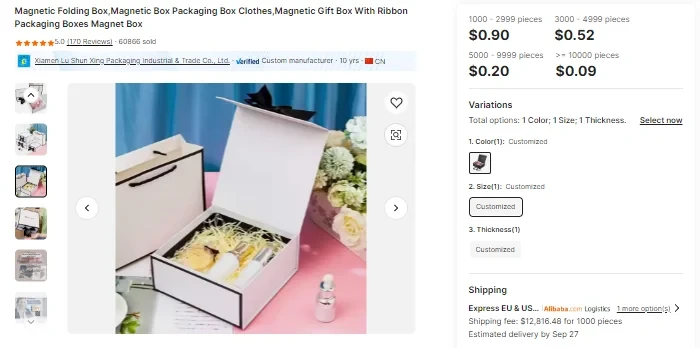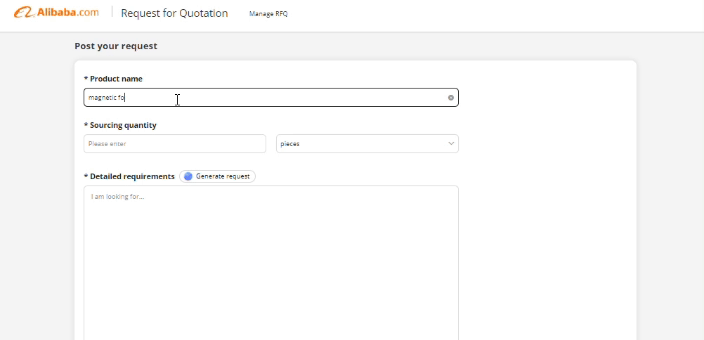After retailers find the perfect product for their business on Alibaba.com, they usually consider how to get the best deals. However, finding the best prices requires more than having long chats with the suppliers. Business buyers must make a professional impression, use realistic prices to set expectations and find suitable and reliable suppliers to negotiate with.
This article will teach you everything you need to know about negotiating for lower prices on Alibaba.com, including how to find the right suppliers.
Table of Contents
4 things to do before negotiating for the best prices on Alibaba.com
6 steps to help create a good inquiry message that attracts the best prices
An example of what to send to Alibaba Suppliers for the best prices
Extra tips to help refine the negotiation message
Bottom line
4 things to do before negotiating for the best prices on Alibaba.com

1. Create a good profile
Creating a profile might not be the first thing retailers think of when negotiating on Alibaba.com, but it may help them secure a better deal. Just as buyers want to know if the supplier is reliable, the supplier wants to see if the buyers are worth their time too. And that’s where the buyer’s profile comes in.
If retailers are a one-person team and are new to ordering in bulk, they may not need most of these details—though adding platforms where they sell or links to their website will be beneficial. On the other hand, more established companies will want to pack their profile with any valuable information that can give them attention.
Here’s how to ensure the profile speaks to suppliers:
- Create an account by visiting the Alibaba.com website.
- Move to the profile icon at the top of the page and choose “Account.”
- Choose “Upload photo” to move to the next tab.
- Upload the business logo and save it before returning to the previous tab.
- Then, choose “My profile.”
- Click on “Edit.” Retailers can find it next to “Company Information.”
- Add as much valuable information about the brand as possible.
2. Find the prices of other Alibaba.com suppliers for a successful negotiation
Retailers should never negotiate without knowing the realistic price to ask for. The best way for them to find it is by searching for similar prices and noting their prices. For example, imagine if businesses want to purchase this magnetic packaging box.

They should search for something like “magnetic folding packaging box” on Alibaba.com (these are the keywords for this product). Then, they would see many products with different price ranges, which would help buyers decide on the best price to negotiate.
3. Create a RFQ (Request for Quotation)
After deciding on the most realistic price to negotiate, retailers should create an RFQ to receive quotes from different suppliers. Here’s how they can do it.
- Go to the profile icon and click on “RFQ.”
- Select “+Post an RFQ” on the RFQ page to move to the next page.

- Enter the product name, which could be “magnetic folding packaging box” in this case. Alibaba usually fills in the name automatically; if not, buyers can type it in manually.
- Next, add the sourcing quantity, measured in pieces by default. However, buyers can change it to ounces, packs, pairs, pallets, parcels, or perches.
- Lastly, add the detailed requirements for the order. The more details buyers add, the better results they will get from suppliers.
Here’s a great example of how businesses should write their detailed description:
“Hello, suppliers,
I’m interested in a product similar to this one: [product URL]. I’d like to customize the color and image, and I want it to have matte lamination and UV coating. I’m aiming for a 30-day lead time. Could you please share your best prices?
Thank you in advance!
Best regards,
[Your Name]
[Your Company Name]”
- Remember to attach a screenshot of the listing to the RFQ before clicking “Invite Suppliers to Quote.”
- Then, businesses will receive quotes from different suppliers offering different prices, which they can also use to negotiate.
4. Find a few suitable suppliers to negotiate with
After receiving several quotes, businesses can sort out the offers and choose trustworthy suppliers. However, if they are not happy with the quotes, they can find other manufacturers to negotiate with the following tips:
- Search for the manufacturers or products directly.
- Use the trade assurance filter.
- Set the maximum MOQ while searching.
- Use the verified supplier filter.
- Set the maximum price (based on the price decided on in “2” or “3”).
- Don’t use the ready-to-ship filter if businesses want to customize it.
Lastly, buyers should create a list of all the suppliers with whom they are comfortable doing business. Then, they should head to the next section to learn how to negotiate with them.
6 steps to help create a good inquiry message that attracts the best prices
Negotiating the best prices on Alibaba.com is all about writing the perfect message. Follow these tips to increase your chances of successfully dealing with suppliers.
Step1: Use the proper salutation

The message should have an excellent first impression, as it can make or break negotiating efforts. Don’t just start the inquiry based on a regular style—Chinese people start their letters with someone’s last name first before the first name. Hence, it would be rude to use only the first name. Consider beginning the letter like this: Dear Mr./Ms. [Lastname] [Firstname].
Note: Buyers can find the supplier’s name using the “Contact Supplier” button on the listing page.
Step 2: Praise the supplier
If buyers can find something genuine to compliment the supplier, they can mention it in the first paragraph of their inquiry message. Sincere praise is a great way to make a good impression and improve the chances of a successful negotiation. For instance, they could highlight whether the manufacturer has won any awards.
Nevertheless, businesses must avoid going overboard with their compliments. It must sound sincere, or it could backfire. So, if there’s nothing authentic to praise, it’s a good idea to skip it altogether.
Step 3: Place yourself as a high-value customer

Retailers must let the supplier know they are looking for a long-term partnership and share how often they plan to place large quantity orders. Suppliers who see that they can offer continuous business are more likely to be open to negotiation.
Step 4: Offer to order more than their MOQ
Offering to buy more than a supplier’s minimum order quality can boost a retailer’s chances of a successful negotiation. After all, it’s more profitable for manufacturers when someone places a larger order.
Step 5: Bargain with the lowest offer received

Imagine if the best offer businesses get for the “magnetic folding packaging box” on their RFQ or search results is US$ 1.20. It may look reasonable, but what if retailers could negotiate a bit lower? If one seller buyers want to deal with is offering US$ 1.21, they can leverage competitive pricing by mentioning the lowest offer they received to get a better deal—possibly 10% or 15% lower.
Step 6: Politely end the inquiry message
Remember to always be polite. It helps put people in a good light, no matter which part of the world buyers live in. Don’t spoil good negotiating chances with a poor or seemingly rude conclusion.
An example of what to send to Alibaba Suppliers for the best prices
Here’s a great example of a message businesses can send based on the six steps discussed above. It’ll give a clearer idea of how brands can create the perfect message for better negotiation chances.
“Dear Mr. Liu Zhang, (Step 1)
I saw that your company was recognized with the [award name], which is truly impressive! Clearly, your business is a strong fit for the product we’re interested in, and we’d love to establish a partnership. (Step 2)
We’re looking for a long-term supplier for [product type], as we expect to need around 4,000 units in three months and about 7,000 units six months from now. Currently, we’re looking to purchase 2,000 units. (Steps 3 and 4)
We’ve received some quotes with prices close to yours, but we’re hoping for a slightly better price since we’re planning for ongoing large orders. Could you offer US$ 1.10 per unit? (Step 5)
Thank you in advance for your consideration. I look forward to your reply. (Step 6)
Best regards,
[Your name]
[Company name]”
Extra tips to help refine the negotiation message
1. Keep the message short
Shorter messages are often more powerful. Like the example, each paragraph has little text, but it gets the point across quickly. If the message is too long, the supplier may ignore parts or won’t reply. Buyers can also ask a few more questions, but it shouldn’t be too many.
2. Send similar messages to more than one supplier
Remember to send similar messages (but personalized) to other suppliers on the list. Additionally, if buyers have a list of other product URLs that catch their eye, they can contact them to get even better prices.
3. Talk like an employee
By now, buyers should have gotten responses similar to any of the examples below:
- Sorry, US$ 1.21 is our best price. We can’t go lower than that.
- We can offer US$ 1.13.
- We can offer the requested price.
If retailers get the third reply, their negotiation is a success. Also, they still have a chance if suppliers give a second response. However, grabbing that chance requires a different approach.
That’s where talking like an employee comes in. Buyers will increase their chances of getting a better price if the person they communicate with is also an employee. Here’s how they can reply:
“Thank you for your response, [name]! I really appreciate your offer, but my boss insists that it is more than what we are looking for. Could you offer US$ 1.10 instead? Because I’m looking to order more than your MOQ. Thank you.”
Bottom line
Getting the best product prices on Alibaba.com can be stressful, but the results are usually worth it. Buyers will get more affordable offers and open channels to build a good relationship with the supplier and get even more discounts. Remember, the negotiating power is all in the writing, so use these steps to craft the perfect message to secure those fantastic deals.
However, buyers shouldn’t think suppliers will respond in hours. There might be a time difference between both countries. So, be patient even if it takes a day to get a reply.




